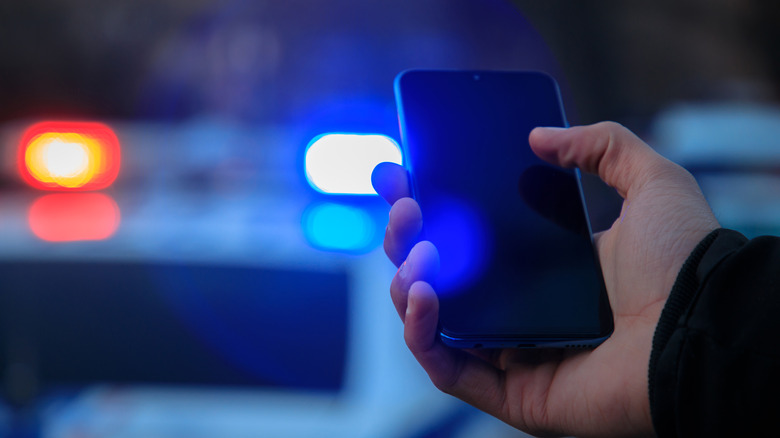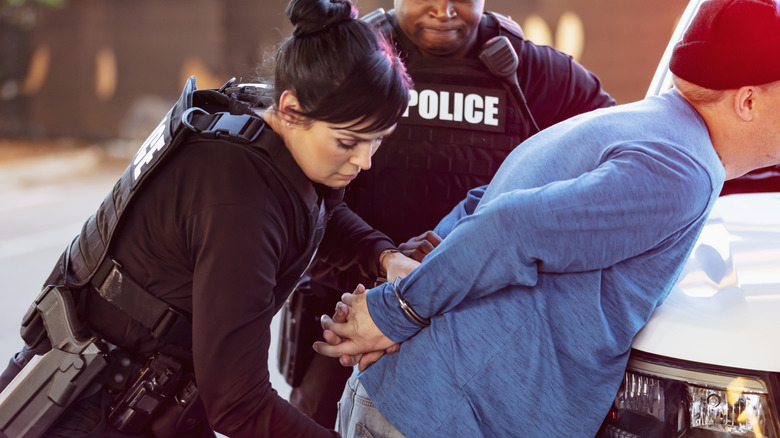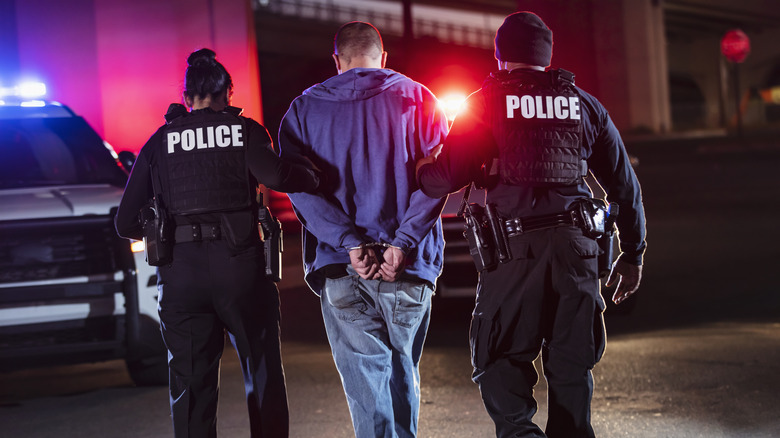Why You Should Never Give The Police Your Phone Without A Warrant
In the age of mobile tech, smartphones are quickly replacing our wallets. In addition to technology like NFC payments, many states now let you store a digital version of your state ID on your phone, with some even going so far as to let you store your ID in Apple Wallet or Google Wallet. And while that technology is convenient for a quick trip to the liquor store, there's a very good reason to carry your physical ID with you instead. In encounters with law enforcement, officers can require you to procure your ID, and even if they're willing to accept the digital version as a form of identification, handing over your phone is a bad idea.
Public sentiment about police is mixed, but whether you view them positively or negatively, one thing is for certain: you should not hand your phone to a police officer voluntarily. It doesn't matter if you feel you have nothing to hide. As any lawyer can tell you, anything the police find can be used against you in a court of law, whether or not you've actually committed a crime. Even if you follow the best smartphone security practices, police may have access to sophisticated data recovery tools, and have even used a dead man's finger to open his phone. Here's why you should never give your phone to the police, and how to protect your phone from being searched by them.
Never hand your phone to an officer without a warrant
As of this writing, multiple states have made digital IDs available to their citizens. In some states, such as Colorado, these digital IDs can be used during police encounters. There's no issue with using digital IDs to get into a bar or make purchases at stores, but you should not otherwise hand your phone over to a police officer or other law enforcement official unless they have a warrant for it.
If you're asked for ID by a police officer and, in a state that allows them to be used in such situations, hand over your phone to show them your digital ID, there's not much to stop the officer from browsing your texts, photos, and any other apps. You've basically given them carte blanche to search the device.
In the landmark case Riley v. California, the Supreme Court held that police cannot search cell phones without a warrant. Chief Justice Roberts wrote in his opinion that even in the case of an arrest, police must procure a warrant to search a seized phone. However, just as inviting police into your home without a warrant means they can conduct a search and use it against you, once you've voluntarily handed your phone over to them in an unlocked state, they can still search it under the pretext that you gave consent. In some instances, police have taken phones that were handed to them in a specific context, and what would otherwise have been a violation of the phone owner's rights instead entered a legal grey area.
Even with a warrant for your phone, you have rights
Assuming you don't hand your unlocked phone to police and they manage to come back with a warrant for it, or even if the phone is taken from you as part of an arrest, you can't be forced to unlock it using a password, PIN, or pattern. Because that information is stored in your mind, it is covered by the Fifth Amendment to the U.S. Constitution which guarantees that no one can be forced to self-incriminate. However, when it comes to biometric security like fingerprints and face recognition such as Face ID on iPhones, police can force you to let them into your phone using those biometrics.
According to a 9th Circuit ruling that has serious implications, physically grabbing someone's thumb and forcing it onto the fingerprint sensor of their phone, or even holding them by the head to force access to a face scanner, is the same as forcing someone to be fingerprinted at a police station. Laws in your area may differ one way or the other, and this remains somewhat unsettled, but it's still best not to use biometric security if you want to keep your phone's data away from the long arm of the law.
You may feel you have nothing to hide, so who cares if a cop looks at your phone? But can you prove that the joke you made to your friend about drugs was really a joke? Anything can be used against you if the right context can be established, so it's best not to cross that bridge in the first place. It's always best to use your physical ID.


